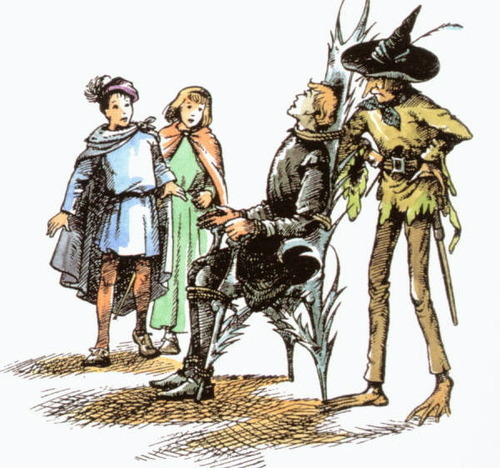
It seems obvious that "God exists" if, by way of definition, we posit "a power greater than I," and, as a defining characteristic of that power, this premise: "the whole is greater than the sum of its parts."
The Universe is necessarily more than it seems.
The Universe is necessarily more than it seems.
At the same time, I have no problem with refutations of "God" as "a bearded guy in the sky."
However, the urge to refute "a bearded guy in the sky" is a (deliberate?) distraction that "overlooks the obvious."
Despite the purported "intelligence" of celebrated atheists, it is odd that their evangelicism is more problematic than solutionary, more obfuscatory than clarifying.
I will pay closer attention when they use the terms "Ground of Being" and "Magnum Mysterium."
I will pay closer attention when they use the terms "Ground of Being" and "Magnum Mysterium."
Humanism, divorced from the inscrutability of The Magnum Mysterium, is too shallow -- too tinny -- to provide trans-millennial sustenance.
Although I disagree with some fundaments of C.S. Lewis' theology, he does an excellent job describing this "tinniness":
"All the books were beginning to turn against me. Indeed, I must have been blind as a bat not to have seen, long before, the ludicrous contradiction between my theory of life and my actual experiences as a reader. George MacDonald (the Scottish fantasist) had done more to me than any other writer; of course it was a pity he had that bee in his bonnet about Christianity. He was good in spite of it. Chesterton had more sense than all the other moderns put together; bating, of course, his Christianity. Johnson was one of the few authors whom I felt I could trust utterly; curiously enough, he had the same kink. Spenser and Milton by a strange coincidence had it too. Even among ancient authors the same paradox was to be found. The most religious (Plato, Aeschylus, Virgil) were clearly those on whom I could really feed. On the other hand, those writers who did not suffer from religion and with whom in theory my sympathy ought to have been complete -- Shaw and Wells and Mill and Gibbon and Voltaire -- all seemed a little thin, what as boys we called "tinny." It wasn't that I didn't like them. They were all (especially Gibbon) entertaining; but hardly more. There seemed to be no depth in them. They were too simple. The roughness and density of life did not appear in their books..... The only non-Christians who seemed to me really to know anything were the Romantics; and a good many of them were dangerously tinged with something like religion, even at times with Christianity. The upshot of it all could nearly be expressed in a perversion of Roland's great line in the Chanson --- "Christians are wrong, but all the rest are bores."" C.S. Lewis
"Puddleglum Proclaims My Favorite Declaration Of Faith"
Tolkien, Lewis, Rowling And The Redemption Of The Modern World
Pax tecum
Alan
PS Although the posted version of this correspondence is titled "The Appalling Failure Of Secular Humanism To Accommodate The Mysterium Magnum," it is at least as appalling that "devout" religious practitioners -- threatened by The Mysterious Magnum -- take refuge in logorrheic positions that block transcendent communion by interposing the pretzel logic of dutiful dogma.
Consider Pope Eugenius' supposedly "infallible" teaching: "It (the Roman Church) firmly believes, professes, and proclaims that those not living within the Catholic Church, not only pagans, but also Jews and heretics and schismatics cannot become participants in eternal life . . . and that no one, whatever almsgiving he has practiced, even if he has shed blood for the name of Christ, can be saved, unless he has remained in the bosom and unity of the Catholic Church."
Council of Florence (1441), Pope Eugenius, Decree for the Jacobites, in the Bull Cantata Domino)
I also recommend the following discussion of Pope Eugenius' decree at http://forums.catholic.com/showthread.php?t=134267
Despite his evident ardor, Pope Eugenius does not define "truth."
Instead, he constructs a bureaucratic-institutional escape for rigid absolutists who are desperate to avoid direct apprehension of Deity.
Instead, he constructs a bureaucratic-institutional escape for rigid absolutists who are desperate to avoid direct apprehension of Deity.
13 “I’ve had it with you! You’re hopeless, you religion scholars, you Pharisees! Frauds! Your lives are roadblocks to God’s kingdom. You refuse to enter, and won’t let anyone else in either.
15 “You’re hopeless, you religion scholars and Pharisees! Frauds! You go halfway around the world to make a convert, but once you get him you make him into a replica of yourselves, double-damned.
Yeshua Excoriates Fellow Pharisees: "The Woe Passages"
On Tue, Aug 18, 2015 at 11:48 AM, Fred Owens <froghospital911@gmail.com> wrote:
Balzac is quite a bit different than Chesterton. He finds women to be all-forgiving and at the same time totally vengeful.Balzac is the source of all French secular humanism.... He never credits divine intervention in his human comedy
--Does the following observation strike you as fundamentally true?"When women love us, they forgive us everything, even our crimes;
when they do not love us, they give us credit for nothing, not even our virtues."Honoré de Balzac, 20 May 1799-1850I have been pondering the zoological impulse to reproduce and am increasingly convinced that humans are largely subject to unconscious sexual urges that we gussy up with overlays of Romance.
Remarkably, the most volcanically animalistic of all human activities -- sexual intercourse -- is the one we most delicately romanticize.
That said, it is my experience that women are supremely practical creatures (likely attributable to the inexorable practicalities of child-rearing) whereas men keep romance alive.If women are biologically impelled to choose a "dependable provider and protector" who faithfully assists in raising children to maturity, then, once they've made their spousal choice, it seems they will stand by their man (must stand by their man?) even if he's a heinous criminal.
Perhaps this perceived obligation is (at least part of the reason) many women live with domestic abuse.By all accounts Chesterton very much loved his wife.He also observed that women are essentially fascist "in the home" while men are chiefly responsible for propagating "fair play" in the larger world.Pax On Both Houses: Compendium Of G.K. Chesterton PostsPax tecum
Alan


No comments:
Post a Comment